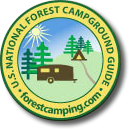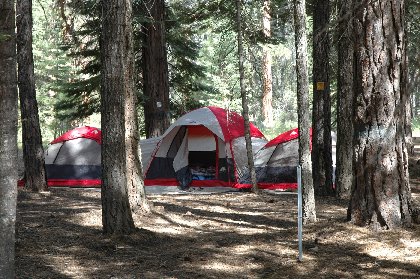Novice campers – Buying a tent
This year more novice campers will discover the joys of camping and the wonders of national forests. This is a good thing but camping can be scary. Especially to novice campers. If you have never build a campfire, slept under the stars, or spent time in the woods, there is a lot to learn. Camping isn’t hard but it can be a challenge. Four things critical to a “successful” camping adventures are shelter, sleep, food, and determining the best style of camping (dispersed camping vs developed campground) for the camper.
Let’s start with the general topic of shelter
There are several options for shelter. You can use your vehicle if the back is big enough or you could rent a cabin or try something in between. Many novice campers start with a car and tent so that’s were we’ll begin.
The most challenging thing about car camping is the car’s lack of room. Don’t try to take everything! For a weekend, you can make do with a change of clothes, fire building stuff, food, a tent, some personal hygiene stuff, and a sense of adventure.
If you are totally new and not at all sure camping is going to be your thing don’t waste your money on a new tent. Borrow or rent one. (Check a local outfitter store such as REI about renting all the camping equipment you need.) A tarp stretched between two trees might be an option is the weather is predicted to be perfect.
Buying a tent
However, if you a fairly sure camping is something you will want to do again, than, by all means, buy a tent. There are lots of choices and the internet has reviews for just about every manufacturer and model. A good place to start your research is with Consumer Reports or at your local outfitter store.
At your local outfitter store, pick the salesperson’s brain. Any hesitations answering your question, get another salesperson. Yes, places like Walmart and Target will have tents and the prices are attractive but the salespeople won’t have the practical knowledge of the equipment you need. While the tents offered in non-camping focused business maybe cheaper, a serious consideration should be given to durability. Think of it this way: If you buy a tent for $200 and use for 20 weekend camping trip, the cost is $10 per trip. And if you buy a tent for $25 and it doesn’t make it through a weekend of camping in your backyard, that tent costs is $25 per trip. Which seems the most cost effective to you? In other words, “Don’t go cheap!” if you want a tent to last longer then one trip.
Other tips are
- Select a size that will offer all the occupants comfort. Tents are rated 2-person, 4-person and so and each “person” is crammed into that tent and no consideration is given to anything else you might want to store in the shelter of a tent. When we go camping, the “kids” (a couple of snuggle-bug dogs) share the tent with us so a 4-person tent was our best option..
- A consideration of size should include the roof line. Dome tents are great but not if you are leaning over all the time.
- Another rating used for tents is 3 or 4 season. Don’t worry about seasons. As long as the tent keeps you dry, investing in a quality sleeping bag is a better use of your money.
- Practice setting up your tent in the backyard or living room. As with most things, a little practice goes a long way to insure success.
- When you get your tent invest in “seam sealer”. While you have your tent set up in the back yard, apply the “seam sealer” to insure you will have some place dry if it should rain.
- A drop clothe or quality tarp is good under the tent but a lightweight inexpensive tarp or drop clothe inside your tent will make clean up so much easier.
Back in the day, we would dig a trench around the tent. Allegedly, it was to keep the tent dry. (Personally, I think it was just a ploy to keep the children busy.) This practice is now frowned upon and thanks to the evolved construction of many tents today, unnecessary. However, staking your tent is a very good practice, especially when the wind picks up in storm. You’ll find stakes at that outfitter store where you started this adventure.




A great way of choosing the right tent size is also to simply compare your body size with the measurements of the tent. How well do you fit in, and how much space will still be left for your equipment? Can you sit up or stand fairly straight? Measure your bed and check how much sleeping space you are having at home. Does the tent offer you the same amount of sleeping space? If it does, fine. If not, you might want to look for a bigger one.
Good points, Bettina.